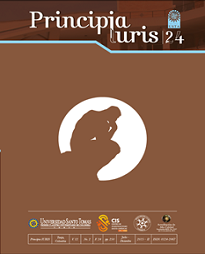PSYCHOSOCIAL RISK FACTORS RELATED TO THE GROUNDS FOR DEPRIVATION OF PARENTAL RIGHTS
Main Article Content
Abstract
Article Details
Por medio de esta comunicación certifico que el artículo que estoy presentando para posible publicación en la revista institucional impulsada de la Facultad de Derecho de la Universidad Santo Tomás seccional Tunja, Principia Iuris, es de mi entera autoría, siendo sus contenidos producto de mi directa contribución intelectual.
Todos los datos y referencias a publicaciones hechas están debidamente identificados con su respectiva nota bibliográfica y en las citas que se destacan como tal.
Por todo lo anterior, declaro que el material presentado se encuentra conforme a la legislación aplicable en materia de propiedad intelectual, y por lo tanto, me hago responsable de cualquier reclamación relacionada a esta.
En caso de que el artículo presentado sea publicado, manifiesto que cedo plenamente a la Universidad Santo Tomás seccional Tunja los derechos de reproducción del mismo y accedo a las modificaciones que de forma se requieran para adaptarse a la estética de la revista. Como contraprestación de la presente cesión, declaro mi conformidad de recibir (2) ejemplares del número de la revista en que aparezca mi artículo.
References
Arce, L. (1995). Conflictos en la evolución del adolescente. Teoría y metodología para la intervención en familias. Costa Rica: Universidad Nacional.
Bronfenbrenner, U. (1987). La ecología del desarrollo humano. Cambridge: Harvard University Press.
Card, N., & Little, T. (2007). Longitudinal modeling of developmental processes. International Journal of Behavioral Development, 31(4), 297-302.
Carrasco, M. A., & González, M.J. (2006). Aspectos conceptuales de la agresión: definición y modelos explicativos. Acción psicológica, 4(2), 7-38.
Cava, M.J., Murgui, S., y Musitu, G. (2008). Diferencias en factores de protección del consumo de sustancias en la adolescencia temprana y media. Psicothema, 20(3), 389-395.
Del Barrio, V. (1998). Educación y nuevos tipos de familia. Psicología educativa, 4, 23-47.
Escudero, M. (2013). Procedimiento de familia y del menor. Bogotá: Leyer.
Kempe, R. (1998). Niños maltratados. España: Morata.
Kurdek, L. A., & Fine, M. A. (1994). Family acceptance and family control as predictors of adjustment in young adolescents: Linear, curvilinear, or interactive effects? Child Development, 65(4), 1137-1146.
Lerner, R. (1986). Concepts and theories of human development. New York: Random House.
López, I. (2005). Un análisis de la eficacia del apoyo social en familias en situación de riesgo psicosocial. Bilbao: Psicoex.
Luthar, S., Cicchetti, D., y Becker, B. (2000). The construct of resilience: A critical evaluation and guidelines for future work. Child Development, 71(3), 543-562.
Martín, J., Máiquez, M., Rodrigo, M., Correa, A., y Rodríguez, G. (2004). Evaluación del programa apoyo personal y familiar para madres y padres en situación de riesgo psicosocial. Infancia y Aprendizaje, 27(4), 437-445.
McAdams, C. (2002). Trends in the occurrence of reactive and proactive aggression among children and adolescents: Implications for preparation and practice in child and youth care. Child & Youth Care Forum, 31(2), 89109.
Minuchin, P. (1985). Families and individual development. Buenos Aires: Paidós.
Menéndez, S. (2008). Familia y adaptación escolar durante la infancia. Sevilla: XXI Revista de educación, 10, 97-110.
Piaget, J. (1992). Estudios de Psicología Genética. Argentina: Emecé.
Ripol, A. (2011). Estrategias de mediación en asuntos familiares. España: Reus.
Rodrigo, M.J., Máiquez, M.L., Martín, J.C., y Byrne, S. (2008). Preservación familiar. Un enfoque positivo para la intervención con familias. Madrid: Pirámide.
Rodríguez, G., Camacho, J., Rodrigo, M.J., Martín, J.C., y Máiquez, M.L. (2006). La evaluación del riesgo psicosocial en las familias usuarias de los Servicios Sociales Municipales. Psicothema, 18(2), 200-206.
Rodríguez, M., del Barrio, V. & Carrasco, M. (2010). El libro de la familia: un G.P.S. educativo. Madrid: Defensor del Pueblo.
Rutter, M. (1987). Psychosocial resilience and protective mechanisms. American Journal of Orthopsychiatry, 57(3), 316-331.

